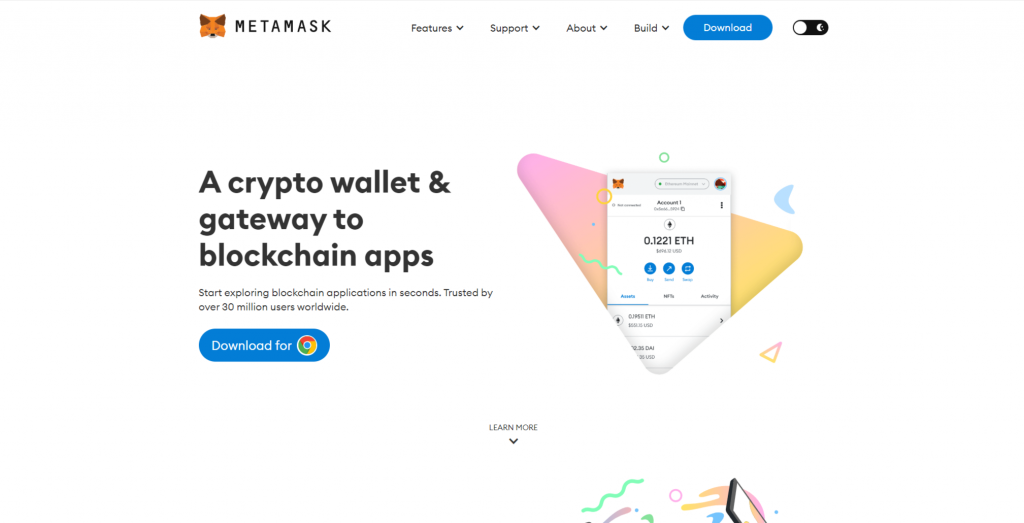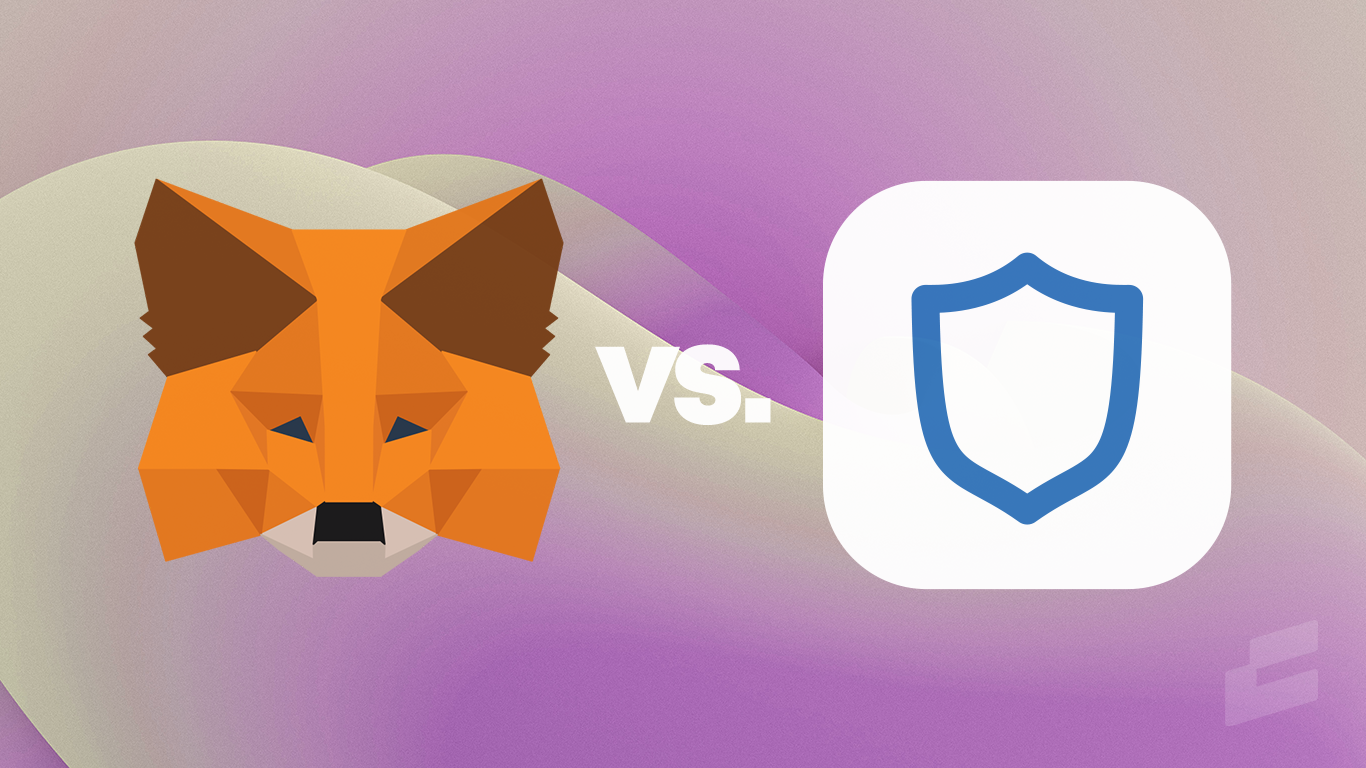When comparing the available options of crypto wallets, there are certain things to look out for when choosing one that suits your needs. Trust Wallet and MetaMask are two of the most popular digital wallets in the space and are used by thousands of daily crypto users to store and move their crypto assets.
Despite sharing certain similarities, these two wallets are still unique in the solutions they offer. In this MetaMask vs. Trust Wallet comparison, we’ll look at and compare the features, safety, ease-of-use, fees, and compatibility of these two digital wallets to help you gain a better understanding.
MetaMask Wallet
Best wallet for Ethereum applications

MetaMask is an easy-to-use crypto non-custodial wallet made for the Ethereum blockchain. Although Ethereum is the main driver, MetaMask is also compatible with various layer-2 blockchains including Polygon, Avalanche, Binance Smart Chain, Arbitrum, Optimism, and Fantom.
MetaMask was established in 2016 by ConsenSys as a web browser extension, it was later developed into a mobile app in 2019. Besides enabling access to blockchain networks, MetaMask also connects you to a variety of decentralized applications (DApps), including decentralized finance (DeFi) platforms and non-fungible token (NFT) marketplaces.
Metamask is built to allow easy connection to popular DEXes like Uniswap, PancakeSwap, and SushiSwap. MetaMask supports ERC-20 token standards, enabling the convenient storage of virtually all Ethereum-based assets. MetaMask also features a cryptocurrency swap tool that facilitates the quick and easy exchange of a wide range of cryptocurrencies such as USDT, LINK, SHIB, and more.
Since MetaMask is a non-custodial wallet, you can export your private keys for individual addresses, along with a backup phrase to recover any lost accounts. MetaMask allows for multiple wallets within a single account, allowing you to easily switch between them depending on what you’re doing.
Since MetaMask is a hot wallet, it is recommended that you do not store large amounts of cryptocurrencies for long periods of time, and rather you should opt for a cold storage wallet which has better security.
Pros
Trust Wallet
Best wallet for multi-chain compatibility

Trust Wallet is a multi-cryptocurrency wallet that allows its you to store, send, receive, trade, swap, and stake a wide range of tokens. Since it was acquired by Binance in 2018, Trust Wallet has been the official decentralized wallet of the Binance Crypto Exchange, supporting different kinds of digital assets on more than 65 blockchains.
On Trust Wallet, you can send and receive any of the Ethereum-based tokens, BNB chain tokens, Bitcoin, and so on. Besides trading and storing cryptocurrencies, this wallet supports NFTs, so, you can store and trade NFTs within the wallet. In addition, Trust Wallet provides a DApp browser, which allows you to access decentralized apps via your mobile device.
Similar to MetaMask, Trust Wallet is a non-custodial wallet and doesn’t require your data to be set up. The platform’s security is top-notch, protecting digital assets with a password and a recovery phrase. In addition, the wallet is hierarchy-deterministic, meaning that your transaction history cannot be tracked or monitored by strangers. These safety nets are in place to protect Trust Wallet users from cyber attacks and ensure secured access to their assets if they accidentally get locked out.
Pros
MetaMask vs. Trust Wallet Comparison
| MetaMask | Trust Wallet | |
|---|---|---|
| Security | Moderate | Moderate |
| Beginner Friendly | Yes | Yes |
| Fees | No | No |
| Supported Cryptocurrencies | Over 180 cryptocurrencies, including Ethereum-based tokens (ETH, AVAX, MATIC, and so on) | More than 190 cryptocurrencies, including Bitcoin, BNB, ERC-20 tokens, BEP-20 tokens, and so on |
| Mobile App | Yes | Yes |
| Desktop Software | Yes | Yes |
| NFT Support | Yes | Yes |
| Compatible With Hardware Wallets | Yes | No |
Security
Both MetaMask and Trust Wallet offer moderate security features to ensure the safe storage of cryptocurrencies and other digital assets. For example, they offer a file embedded with private keys that allow users to safely access and manage their crypto funds. However, these two wallets still rely on the user’s ability to not fall victim to phishing and cyber-attacks.
Beginner-Friendly
MetaMask and Trust Wallet have a simple user interface that can be easily navigated by a newbie. Setting up a Trust Wallet, for example, can be completed in a few easy steps. Begin by downloading the app, and you will be done setting it up in no time. MetaMask is also easy to use – both as a web browser extension and as a mobile app on iOS and Android.
Fees
The fees for using MetaMask and Trust Wallet are minimal. Besides the gas fees for transactions, the two wallets don’t charge any other fees and are free to use.
Compatibility
Of course, Trust Wallet supports more tokens and blockchains than MetaMask. Moreover, Bitcoin is not available on MetaMask, but on Trust Wallet. That said, both wallets support NFTs, Ethereum-based tokens, and Binance Smart Chain.
Our Verdict: Trust Wallet is the Winner
While MetaMask is the more popular wallet, one cannot deny the attention Trust Wallet has enjoyed amongst crypto enthusiasts in the last couple of years. And, considering its integration with several cryptos and third-party exchanges, Trust Wallet might have the edge over MetaMask. Plus, it supports more blockchain networks, including the biggest of them all – Bitcoin.
Having said that, you must consider the features you are looking for in a cryptocurrency wallet before settling on a choice. In any case, picking one of the wallets discussed above will help ensure easy accessibility and security of your assets.








